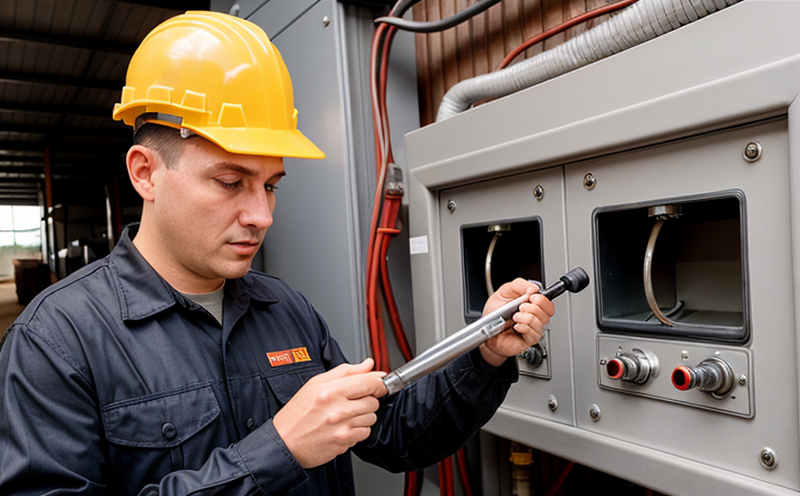Commissioning Inspection & Functional Verification
In today’s fast-paced manufacturing and engineering sectors, ensuring that newly installed equipment operates efficiently and reliably is critical. Commissioning inspection and functional verification are essential processes designed to confirm that all systems meet design specifications and are ready for production use.
The commissioning process involves a series of steps aimed at verifying the functionality and performance of new or overhauled machinery. It ensures that each piece of equipment operates as intended, minimizing downtime and potential failures. This process typically includes:
- Initial setup checks
- Detailed functional tests
- Data logging and analysis
- Compliance with relevant standards and specifications
The primary goal is to identify any discrepancies between the actual performance of the equipment and its design requirements. Once identified, these issues are addressed before the system goes into full operation.
Functional verification involves a series of tests that simulate real-world operating conditions. This ensures the equipment performs as expected under various scenarios. For instance, in the automotive sector, this might involve testing braking systems across different road surfaces and weather conditions.
The importance of these inspections cannot be overstated. A single malfunctioning component can lead to costly downtime or even safety hazards. By conducting thorough commissioning inspections and functional verifications early on, potential issues are addressed before they escalate into larger problems down the line.
Our team at [Your Lab Name] employs state-of-the-art technology and methodologies to ensure that each inspection is conducted efficiently and accurately. We use cutting-edge tools such as ISO 9001 compliant equipment and follow strict procedures outlined in international standards like ASTM E23.
In addition to our technical expertise, we also offer comprehensive documentation services. This includes detailed reports that outline the findings of each inspection, along with recommendations for any necessary adjustments or upgrades.
Our team consists of experienced professionals who have extensive knowledge and hands-on experience in various industries. They are well-versed in the latest techniques and best practices used in commissioning inspections and functional verifications.
To further emphasize the importance of this process, let’s consider a real-world example from the aerospace industry. A faulty engine control unit could lead to catastrophic failure during flight. By ensuring that all components work together seamlessly through rigorous testing, we help prevent such incidents.
Quality and Reliability Assurance
- Data Accuracy: Ensuring that the data collected during inspections is accurate and reliable forms the foundation of our quality assurance processes. We use advanced technologies to minimize human error and provide consistent results.
- Compliance Verification: Our team verifies compliance with all relevant standards and regulations, ensuring that every aspect of the equipment meets industry benchmarks.
The process starts by collecting baseline data on the equipment before any modifications or installations. This serves as a reference point against which subsequent tests can be compared. Any deviations from this baseline are flagged for further investigation.
A key component of our quality assurance framework is continuous improvement. We regularly review our processes and procedures to identify areas where they can be enhanced. For example, if we discover that certain testing methods yield inconsistent results, we will explore alternative approaches until we find the most effective solution.
Another critical aspect of ensuring reliability lies in identifying potential failure modes early on. By doing so, we can implement preventive measures that reduce the likelihood of these failures occurring during actual operation.
Customer Impact and Satisfaction
- Operational Efficiency: Timely completion of commissioning inspections helps maintain production schedules, reducing delays caused by equipment malfunctions. This leads to higher customer satisfaction as products reach the market sooner.
- Safety Measures: Ensuring that all systems operate safely is paramount in any manufacturing or engineering environment. By catching potential hazards during the inspection phase, we help protect both employees and end-users from injury.
We understand that our clients rely on us to provide accurate, timely information about their equipment’s performance. That’s why we strive to deliver comprehensive reports within specified timelines. These reports include detailed descriptions of the tests conducted, observed anomalies, and suggestions for corrective actions.
Customer feedback plays a vital role in shaping our services continuously. We actively seek out suggestions from our clients regarding how we can improve our offerings further. Whether it’s through surveys or direct communication, your input is invaluable to us.
In conclusion, by prioritizing quality and reliability assurance throughout the commissioning process, we aim not only to meet but exceed customer expectations. Our unwavering commitment to excellence ensures that every project receives personalized attention tailored specifically towards achieving optimal outcomes for our clients.
Competitive Advantage and Market Impact
The ability to deliver reliable products on time is crucial in today’s competitive marketplaces. By offering thorough commissioning inspections and functional verifications, we position ourselves as leaders in the field of equipment testing and validation.
- Innovation: Keeping abreast of new technologies allows us to incorporate innovative solutions into our services. This not only enhances our capabilities but also sets a benchmark for others in the industry.
- Reputation Building: A strong reputation built on delivering high-quality results fosters long-term relationships with clients. As word spreads about our expertise and reliability, we attract more business opportunities.
Our focus on excellence extends beyond just meeting current standards; it also includes anticipating future trends within the industry. By investing in research and development, we stay ahead of the curve, ensuring that our services remain relevant and effective even as technology evolves.
In summary, by leveraging these strategic advantages, we contribute significantly to maintaining a competitive edge in global markets. Our commitment to quality and reliability ensures that clients receive not just good products but also peace of mind knowing their investments are protected against unforeseen challenges.





